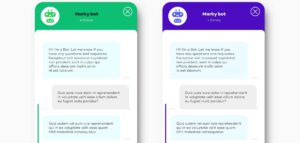Not just another geeky term, natural language processing (NLP) has quickly become a big deal for marketers – particularly on the technical SEO front. Back in 2019, Google experts set the groundwork for NLP with the release of the BERT model, which changed the way that search engines could understand more naturally expressed searches.
Rather than be restricted to processing user queries on a word-by-word basis, BERT brought context into the equation. This major algorithm update meant that search engines would understand meaning less like a computer, and more in the style of a human. But more on this later.
First, let’s get to grips with the machine learning model it was based on…
So, what exactly is natural language processing?

Natural language processing – for short, NLP – is a machine learning technology that can study large bodies of text to decipher meaning. You feed it data, and it (with a surprising degree of accuracy) can interpret, manipulate, and comprehend the complexities of what’s being communicated.
For example, ever used an AI chatbot to get in touch with a company? This is essentially NLP. A chatbot will simulate human conversation (whether spoken or written), figure out your meaning based on the knowledge base it’s been trained on, and give you a response using a combination of pre-programmed scripts and machine learning.
Put more simply, a chatbot pretends to be a human to bridge the gap between you and the devices you’re using to communicate on and with.
And NLP in SEO?
Now, for search engine optimisation, NLP puts emphasis on marketers to prioritise content. It asks us to strategise based on the end-user, the human being on the receiving end of what you’re trying to communicate.
Whereas in the earlier phases of the internet, SEOs could essentially cheat the system by optimising for keywords specifically, Google has said no more.
Gone are the days of cutting corners – think keyword stuffing and, more recently, AI-scaled content (especially with the Google penalty); now, helpful content is at the forefront.
How natural language processing and BERT make sense of search
NLP is the brain behind BERT. It’s the technology that keeps search results tethered to the ever-evolving ways that users search.
As technology has advanced, and things like voice search have become increasingly adopted (125.2 million users in 2023), the phrases that we use to find information have become less formulaic, now mirroring typical human speech.
Natural language processing and BERT have helped Google to adjust to this more freeform style. After all, Google’s enduring goal is to serve the user – their bread and butter – so adapting to how they converse is key to keeping them part of the conversation.
Google on BERT:
‘These improvements are oriented around improving language understanding, particularly for more natural language/conversational queries, as BERT is able to help Search better understand the nuance and context of words in Searches and better match those queries with helpful results.
‘Particularly for longer, more conversational queries, or searches where prepositions like “for” and “to” matter a lot to the meaning, Search will be able to understand the context of the words in your query. You can search in a way that feels natural for you.’
Incorporating NLP in your SEO strategy
It’s very tricky to give advice on using NLP for SEO as there are, of course, many ways to go about optimising your website for rankings.
That said, we can use the model to at least shortlist what to prioritise.
As mentioned, both NLP and BERT put emphasis on content marketing – specifically, user-focused content. What’s become more important than ever is to analyse not only the keywords of what’s ranking but the intent behind them too.
With BERT enabling Google to understand the context behind search, your content needs to get to the root of what users desire.
But how to go about this?
8 must-dos for building an optimised webpage
Keyword research
You can use NLP tools to identify relevant long-tail keywords that users are actually searching for. This may update your keyword list with more relevant keywords that match up to what the user wants to see. Use your go-to keyword research tools to find which ones are the most valuable for you to try and rank for based on a user’s natural language.
Content creation
Dedicate a greater degree of your content budget and resources to answering FAQs. By answering the ‘people also ask’ questions, you begin to cover everything that a user might be trying to find and increase your chance of visibility in the SERP. It’s also worth adapting the language of your content.
Keep your content clear, with sentences concise. Mirror this within your headings too, so that Google – the reader, too – has an easy time grasping your meaning. Presenting your structure in a logical, clear way improves the user experience and makes it easier to follow by targeting the actual human behind the query.
Semantic SEO
By using semantic SEO practices, you optimally hit all the needs of the user by using the methods we’ve listed. One of these methods also includes topic clustering- by building your topical authority, users see your site as a credible source and you cover all their needs on your page alone.
User intent analysis
Spend some time exploring the SERP – or use SEO tools – to pair up the type of content you’re producing with what’s being rewarded. For example, if a bunch of product pages are ranking high for your keyword, this indicates users are seeking to buy, so you’ll need a commercial page to compete.
Featured snippet optimisation
Provide concise, informative responses to boost your chances of appearing in featured snippets. This links back to answering those commonly asked questions and answering queries that are synonymous with your target keyword.
Integrate clear links
To signal to Google what topics your content needs to be associated with, include topically related links, as well as links that ease how the user can navigate your site.
Structured data
Structured data gives added context for the search engine to then display to the user. It can include things like product schema and review schema to satisfy what a user wants to see and improve their overall experience. By using NLP, the search engine may know that the user wants to see ratings or product info, so by including this structured data you give your site more chance of ranking highly.
Optimise for voice search
Optimising for voice search inevitably optimises for the speech of a user, helping your ranking position in the SERP of voice queries. By using NLP technology, you can create content that additionally covers the needs of a voice search user.
Need help boosting your website rankings?
We’re here to talk.
Here at Embryo, our experienced SEO and content experts have no end of experience in getting our clients’ websites to rank high. We analyse what’s being rewarded and then consult, produce, and publish effective content that outperforms. It’s what we love.
If you need any help at all in re-evaluating your SEO strategy in line with what Google is pushing with NLP, simply contact us today.
FAQs
Answered by Jamie Beatty
Is there a difference between NLP and AI?
Yes, there is a difference, as natural language processing is essentially a subset of AI. It makes it possible for computers to understand, and interpret the human language.
Is NLP going to become more important in the next Google update?
NLP is already a part of Google’s algorithm and will continue to become more important, an indicator of this is through Google GSE which is a sign that NLP-driven content will be more vital for search engines. Also, future updates will be prioritising intent as search engines know they need to be better at interpreting different queries.
Are there any disadvantages of NLP?
There can potentially be some disadvantages, for example, if you have content that lacks enough context then Google’s NLP models could misinterpret the meaning. However, as time goes on, future updates should allow Google to better understand this.














